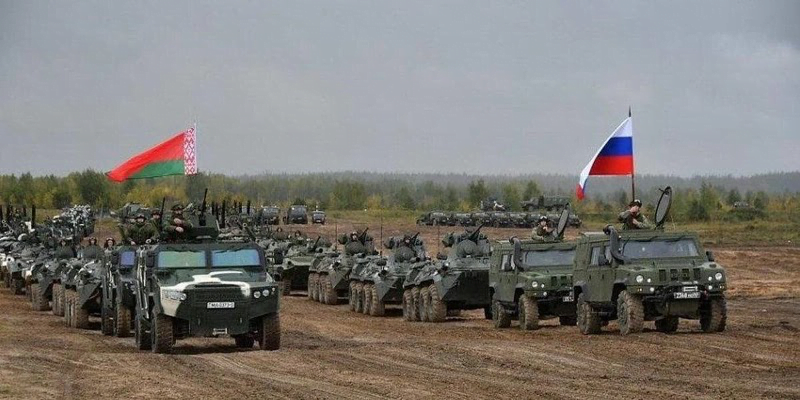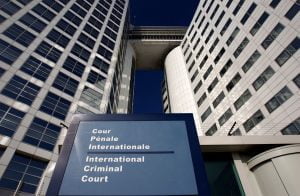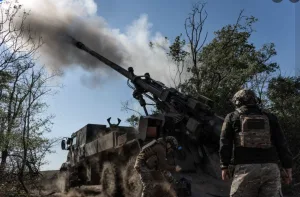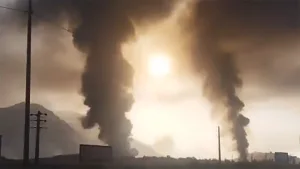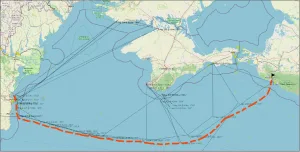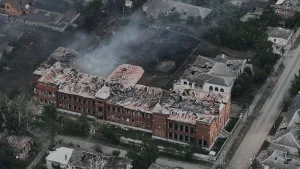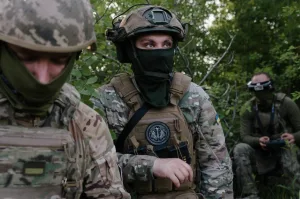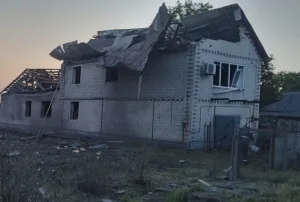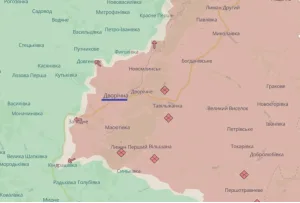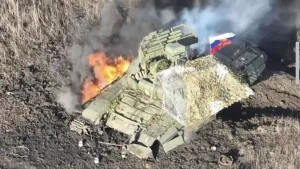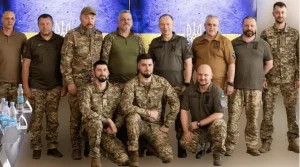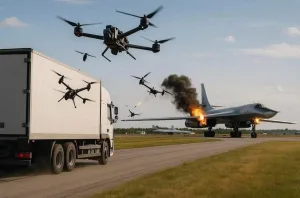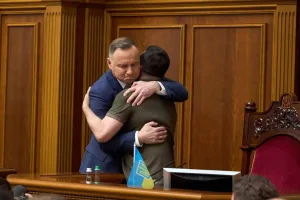Will Lukashenko’s troops invade Ukraine? Belarus is rapidly approaching the point of no return – the direct participation of its military personnel in hostilities against Ukraine.
On February 24, Minsk participanted in Russian aggression against our country, providing its territory for missile attacks on Ukrainian cities, ensuring logistical support for the Russian army, repair of damaged equipment, and treatment of wounded Russian servicemen. Russian sabotage and reconnaissance groups enter Ukraine from Belarus, and the Belarusian authorities connive at hiring their citizens by Russian PMCs to kill Ukrainians.
But the Kremlin, being not content with the fact that the territory of Belarus has become a bridgehead in the war against Ukraine (as can be judged by many signs), decided that the Belarusian military should directly participate in the war. That does not mean that the invasion will take place tomorrow. Although there are seven Belarusian battalions near our northern border, there are no signs of the creation of a strike force and the deployment of a command and control system. However, Putin will do everything to force Alexander Lukashenko to take this step. It is just a matter of time.
Two countries with one army
Although the potential of the Belarusian army is insignificant, one should not underestimate the negative consequences for our country from the participation of Belarusians in the next stage of the war, when they, together with Russian units and under the leadership of the General Staff of the Russian Federation, will cross the border of Ukraine. Some of the experts we interviewed, suggest that an invasion is most likely to occur when Russian troops begin operations on the southern front, trying to seize Mykolaiv and Odesa.
Theoretically, Belarus could be ready for an invasion in a month. You can read one of the possible scenarios made by the coordinator of the Information Opposition group Kostiantyn Mashovets here.
Thus, the Kremlin intends to achieve a number of military goals without attracting additional mobilization resources from Russia itself.
Firstly, to withdraw the strongest Ukrainian units from the east and south and bind our reserve in the west. Secondly, to block the route Kyiv-Kovel-Yahodyn (“Varshavka”) and thus cut off one of the supply channels from the West. Thirdly, to seize the Rivne nuclear power plant, located 60 km from the Ukrainian-Belarusian border, thus, seriously threatening the Ukrainian energy system before winter sets in. It is worth recalling that the head of the RNPP, Pavlo Pavlyshyn, was replaced at the end of June. Perhaps, not the best decision of the authorities before the invasion of Belarus. At the same time, experts doubt that Kyiv will also be the target this time.
One of the political goals of the Kremlin is to strengthen the international isolation of the Lukashenko regime and limit its ability to normalize relations with the rest of the world. Leaving no room for Minsk maneuver, Moscow ties Belarus even more to Russia within the framework of the Union State, pulling it away from the West. Moreover, the direct participation of the Belarusian military in the invasion of Ukraine will demonstrate to the Russians that the “special military operation” is supported by Russian allies.
The psychological aspects are just as important for the Russian military command: only talking about the invasion of the Belarusians should spread fear and panic among the Ukrainians. The fact that the Russian IPSO divisions began to spread information on Ukrainian Facebook, Viber, and Tik Tok about “a possible Belarusian invasion tonight” with reference to “the police and railway services” are not surprising.
In recent weeks, the Belarusian military command has been conducting a series of exercises, carrying out the operational and mobilization deployment of its troops, as well as the reopening of military equipment stored in bases and warehouses. Belarusians deploy electronic warfare systems near our border. Russian instructors train Belarusian special forces. The Ukrainian General Staff reports of a travel ban imposed on Belarusian doctors.
Against this backdrop, Lukashenko made a number of warlike statements. He accused our country of trying to shell Belarus. He threatened the West to strike at decision-making centers: “Don’t mess with us, and we won’t bother you.” He argued that Russia should be ready to use nuclear weapons. He assured that in the war with Ukraine, “the truth today is on the side of fraternal Russia.” He stated that “our participation in the special operation was determined by me long ago,” since Minsk has “the closest alliance” with Moscow; that “a single group of armed forces was created a long time ago in the union of Belarus and Russia. In fact, a unified army”.
Those messages are truly alarming. But when Lukashenko says that “we were and will be together with fraternal Russia,” these words do not mean that the self-proclaimed president of Belarus is eager to take part in hostilities on the side of an ally. On the contrary, he is trying to stay on the edge of the abyss because he understands all the risks from this decision for him and his regime.
Risks for the Lukashenko regime
A study by the German Ebert Foundation “Belarus Tracker of Change” concludes that Western sanctions and the loss of the Ukrainian market have plunged the Belarusian economy into recession. According to the forecasts of independent economists, Belarus GDP losses this year will be about 10%. The decline in living standards affects authority ratings and the stability of the regime, which was able to withstand the anti-government protests in 2020, carrying out harsh repression.
But the risks for the Lukashenko regime will increase even more if the self-proclaimed president decides to directly participate in the invasion of Ukraine.
Firstly, this will strengthen the sanctions against Belarus and representatives of the Lukashenko regime.
Secondly, the sanctions will significantly worsen the economic situation in the country, and since participation in hostilities requires greater financial resources, the regime will become even more financially dependent on the Kremlin. At the same time, Moscow will not be able to compensate Belarus for all the economic losses, even despite the super-profits from energy supplies to Europe. After all, in the medium term, the Russian economy will face hard times.
Thirdly, although a significant part of the Belarusians supports Russian actions in Ukraine, the Belarusian society and the Belarusian military strongly oppose the direct participation of Belarus in the war with Ukraine. That does not mean that the soldiers and officers will not follow Lukashenko’s orders. But seeing what is happening to the Russian army in Ukraine, many security forces representatives resist the participation of Belarus in the hostilities. And some Belarusian servicemen side with us.
Fourthly, as the number of “cargo 200” and the wounded grows, dissatisfaction with the regime will also grow in Belarusian society, which may result in street protests.
All these factors will weaken Lukashenko’s authority. And he can see that very well.
Therefore, Lukashenko uses harsh militaristic rhetoric with statements about a nuclear strike, but at the same time, there are signs of goodwill towards the West. He demonstrates in every possible way that one needs to talk to him and not demonize. In April, Foreign Minister Vladimir Makei sent a letter to European colleagues with a proposal to resume dialogue. And last week, Lukashenko temporarily introduced a visa-free regime for residents of Poland and the Baltic countries.
But Lukashenko’s room for balancing is getting smaller and smaller: seeing the regime’s inability to internally transform, the West does not respond to the signals from Minsk, while Moscow’s pressure keeps growing. Given the dominance of Patrushev and Bortnikov’s agents in the Belarusian KGB, Lukashenko’s growing concerns about an organized by Putin palace coup, which will lead to losing his authority, money, and life, are not surprising. And most importantly, it is not clear what will happen to his youngest, Kolenka.
Vent for Lukashenko
It is quite important for Putin that the decision on the direct participation of Belarusian military personnel in the invasion of Ukraine is made by the legitimate, from his point of view, President of Belarus Lukashenko. But playing along with Putin in his imperial ambitions and making menacing statements about our country, Lukashenko simultaneously says, that he does not seek to fight in Ukraine. How will Putin force the self-proclaimed president to make a radical decision, given the latter’s constant balancing acts?
Anything can be casus belli: the Russian special services are masters of provocations. According to the GUR of the Ministry of Defense of Ukraine, the Russian Main Directorate of the General Staff of the Armed Forces of the Russian Federation is planning a series of artillery and missile strikes on the Mozyr Oil Refinery, civilian infrastructure facilities, and residential areas. During the shelling, residential buildings, hospitals, and schools will additionally be blown up, which is why Russian sabotage groups arrived in Mozyr under the guise of civilians.
At the same time, the Kremlin is not yet interested in removing Lukashenko, since a palace coup attempt carries serious risks: the self-proclaimed president is a key figure in the regime, and his removal can lead to unpredictable consequences. But the direct participation in the Russian-Ukrainian war will finally eliminate its subjectivity. Putin is already saying that political and sanctions pressure from the West is pushing Russia and Belarus “to speed up the process of integration.”
But Putin will not be too soft, seeking the necessary decision from Lukashenko. For example, threatening to take Kolenka’s life. Ukrainian military expert Oleh Zhdanov even admits that the master of the Kremlin can kill Lukashenko if he does not join the war against Ukraine. According to Zhdanov, if Lukashenko manages not to get involved in the war, it “would be a real stab in the back,” since the Russian Federation counts on the Belarusian army to confront the Armed Forces of Ukraine.
Neither joining the Russian-Ukrainian war, nor Belorusian enhanced incorporation into Russia is in the interests of Ukraine. Therefore, the Ukrainian authorities do not launch missiles and air strikes on Belarusian airfields where Russian planes are stationed, so as not to help Putin and organize a casus belli themselves.
But the decision, on whether to take steps toward a politician who has repeatedly demonstrated his dependence on Putin, should be made in Washington, Brussels, London, Paris, Berlin, Warsaw, Vilnius, etc. West must decide whether to offer Lukashenko a lifeline and guarantee a peaceful life in China for him and his son or allow him to reinforce Putin’s troops in Ukraine.
Due to the current specific situation, Lukashenko regime cannot offer Western capitals the expected concessions. But while there are no preconditions for a democratic government to come to power in Belarus, perhaps the key Western players should change their current policy towards Minsk and open a window for the Belarusian society and a vent for Lukashenko. Otherwise, Putin will achieve his strategic goal in Belarus and tactical one in Ukraine.
Volodymyr Kravchenko, ZN.
Tags: russia ukraine war
